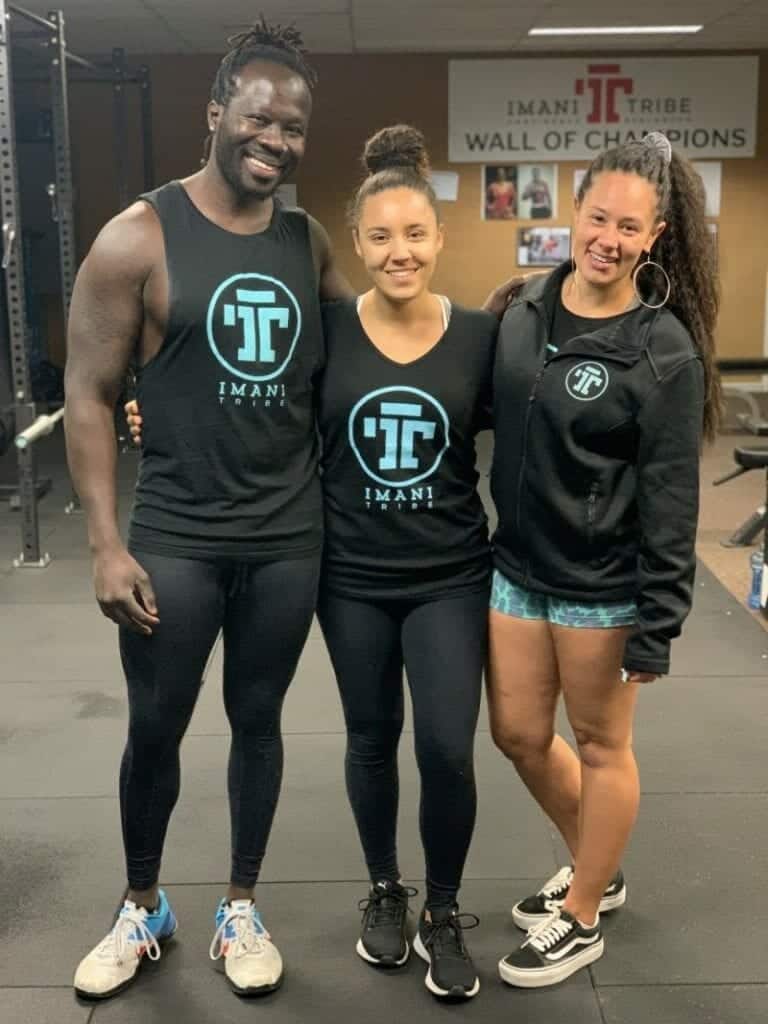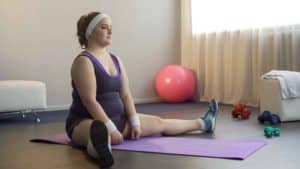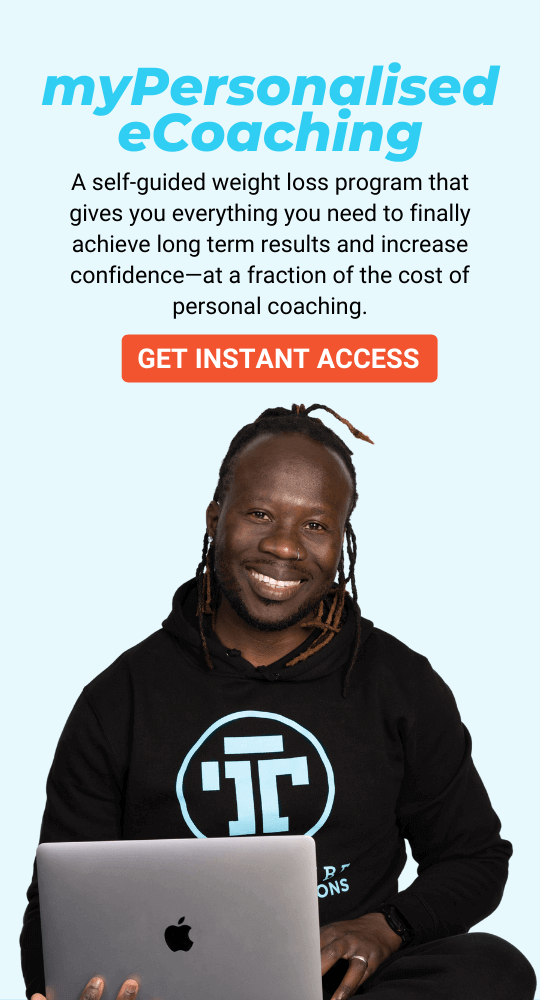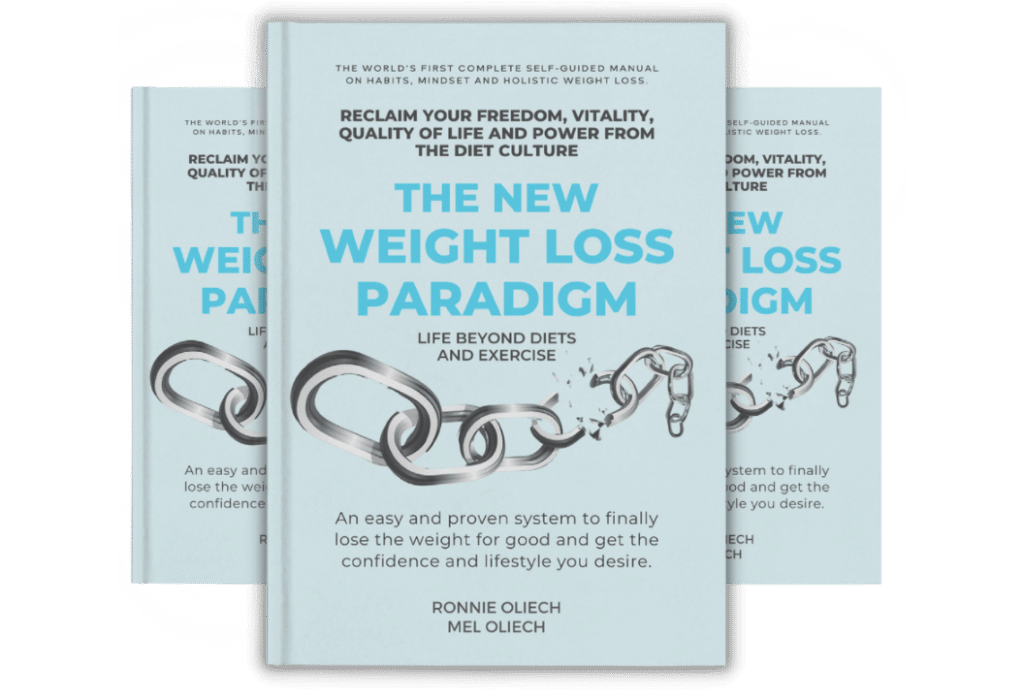When you’re on a weight loss journey, you’ll no doubt be motivated in the beginning.
In fact, you might be so motivated, that you sign up to a variety of things that you think might make your journey easier. Things like weight loss podcasts, health and fitness gurus, online diet plans, or even begin following other people on Instagram or social media who have achieved what you want to achieve.
But what may initially seem to keep you on track, will eventually end up derailing your success. Instead of helping and motivating you, these things will end up confusing you, and distracting you from the things that you need to do to reach your goals.
We call this ‘noise’.
Noise is all the unnecessary things you focus on to distract you from doing the things you think are hard or necessary to achieve your goals.
Sometimes noise can be the right thing for someone else, but not the right thing for you.
Noise can come in a variety of disguises, some of which you’ll recognise as a distraction, but some you may be surprised about.
Here are examples of ‘noise’ that will end up derailing your success.
Diets and quick fixes
One of the most common types of noise are the diets and quick-fixes, including clean-eating and even ‘shredding’. When people try to lose weight, they immediately turn to a diet, because that’s what they’ve been brought up to believe works. However, research shows that intentional weight loss through dieting doesn’t lead to long-term success. Despite this, when you don’t succeed with a diet, you blame yourself instead of the diet. You tell yourself that you’re not strict enough and that it’s your fault it didn’t work. So you end up going on another diet, and another and another — all in the hope that the next one will work.
When they don’t work, you may start piecing bits and pieces of one diet with another, to see if that works for you. But the truth is that diets of any shape or form simply don’t work for long-term weight loss. They only create a vicious cycle where you restrict food, which causes you to binge eat and binge drink. Then you restrict your food even more to make up for the binges, which only leads to more binges – either as a way to soothe yourself or as the body’s physiological need to eat food. And of course, this won’t get you weight loss results.
Success is only found when you ditch the diets and begin working on your habits.
Focus on ‘healthy’ food or supplements
So many people turn their focus to what they consider to be ‘healthy’ food, when they try to lose weight. Whether it’s protein balls, protein pancakes, shakes, smoothie bowls, sugar-free, carb-free, fat-free. But what does ‘healthy’ even mean? It can vary depending on who you ask.
Similarly, you might be tempted to boost your weight loss by doing fasts, detoxes, shake diets or even taking supplements that promise to ‘speed your metabolism’ or ‘burn fat’. The only thing that will get lighter when you use these things is your bank account.
Forget about the fads and the supplements and the so-called ‘healthy’ foods. The best approach is to eat a wide variety of real foods that are rich in colour, texture and taste. Focus on eating foods closest to their natural state, but don’t forget to make time in your week to enjoy the foods you really love — even if that happens to be ice-cream, or burgers. Research shows that a less rigid approach to your eating, and eating a wide variety of different foods will yield the quickest and best results.
The diet mindset
Closely linked to diets is the diet mindset. You may be working on changing your habits and may even be working with a coach to help you do this, but if you approach it with a diet mindset, you’ll continue to be distracted. A diet mindset will lead you to constantly look for the ‘magic pill’ that will solve your weight loss woes, even if you’re not on a diet. It will drive you to do more than what you coach is telling you to do, and it will cause you to focus on the goal, rather than the steps you need to take to reach the goal.
The diet mindset will also lead you to take a bit of what your coach is telling you, and combine it with a bit of something from a diet that seemed to work for a while. But the truth is that these two approaches are not compatible, and will only cause you to become stuck or go backwards. Be sure to read our blog on diet mindset to discover how this affects your weight loss journey.
Diet culture
If you’ve been a dieter, you know how easy it is to move from one to another. The diet industry always finds a way to polish a new diet plan and make it look shinier and more attractive than the last. But believe us when we say, this culture will distract you more than you know.
The diet culture is sneaky and dangerous and can cause anyone to become distracted from long-term weight loss. Even if you know that diets aren’t the answer, the diet industry will still try to suck you in with different terminology. How often have you heard the terms ‘wellness’ or ‘lifestyle’? The truth is, anything that promotes rules around food, cuts out food groups, limits certain foods, promotes high levels of exercise all in order to shrink your body, is part of this diet culture.
The diet culture is so pervasive, that when you’re not accountable to a coach, you’ll end up defaulting back to it. That’s because it has probably featured heavily throughout your life, as the ‘normal’ way to lose weight. Even though you know in your head that diets don’t work, your heart is desperate for a solution, and so you keep giving the next diet and the next one a go, in case it might work.
The only way to stay away from this culture is to make yourself accountable to a coach and keep being accountable.
Believing you can undo decades of dieting damage in 6 weeks
How long have you been overweight? If you’ve been trying to lose weight for 10, 20 or even 30 years, it’s impossible to achieve long-term weight loss success in 6 weeks. Yet that’s what many personal trainers and weight-loss programs promise. The reality is, that dieting damages your metabolism and it can take a long time to undo that damage. And don’t forget that a lifetime of habits — which led you to become overweight in the first place — take more than 6 or 12 weeks to overcome. Accept that permanent weight loss will take time, and focus on the journey, instead of looking for the next ‘magic pill’.
Watching what other people are doing
Watching what other people around you are doing to lose weight is also noise. That’s because everyone has different goals, different struggles, different habits, and different action plans. For example, if you see that someone else is walking 4 times a week, as part of their program, and that they are getting results, it’s easy to assume that you need to walk 4 times a week as well. However, this fails to take into account what the other person wants to achieve, where they’re at, and what other things they are doing. For example, they may be walking because they have an injury that they are recovering from, or they may be at a point where they need more low intensity exercise in order to change their body shape. What works for someone else may not necessarily work for you
Focusing on your own journey, and doing what your coach advises you to do, is the quickest way to weight loss success.
Other people’s ‘success stories’
Speaking of success, comparing yourself to others, or copying what someone else did to lose weight also distracts you from your own journey. Looking at before and after photos of someone else’s transformation can be motivating, but it can also become noise. That’s because a photograph doesn’t tell the whole story of that person’s journey. A photo doesn’t tell you if they went on a crash diet, or followed a grueling exercise program to ‘shred’ quickly. It doesn’t tell you that they may be feeling exhausted and ill from strict dieting and excessive exercise. Even if they took a sensible, sustainable approach, photos don’t show the sacrifices that person made to get their results. They don’t show how much they needed to move out of their comfort zone in order to overcome their fears, or the habits they needed to overcome in order to lose weight.
This makes it easy for you to make assumptions about their journey. You might even say things like “It’s easy for them”, “They don’t have the problems I have”, “They don’t have to work as hard as I do” or “They’re lucky”.
By having pity parties from comparing yourself with a photograph (which doesn’t tell you the whole truth), and making assumptions, you undermine the power you have to change your life. Use the photo as motivation, or as a guide to see what’s possible, but then focus on your own action steps, in order become your own success story.
Complicating exercise
Making exercise more complicated than it needs to be is another form of noise that will distract you from losing weight. By doing so you’ll often be choosing entertainment over results. For example, you might see a fitness guru doing box jumps on their Instagram account, and decide that this is a ‘cool exercise’ that you’d like to be able to do. While there’s nothing wrong with wanting to do box jumps, the reality is this person is an athlete and is doing box jumps in order to improve their explosive strength. If you try to do box jumps in order to lose weight, you’re not going to get results, because these are not the best exercises to help you lose weight. At best, you’ll waste your precious training time. But there’s also a very real chance that you’ll injure yourself, which will compromise your training for an extended period of time.
Forget fancy exercises that look fun and entertaining, and stick to the ones that will give you the weight loss results you crave. Your coach will be able to advise what’s best for you.
Focus on the destination
When setting a goal, it’s easy to think that you need to focus on it to get your results. While you do need to know what you want to achieve and where you’re headed, the magic is in the day-to-day actions. Focusing on what you need to do each day is what will lead you to your destination. When you focus on the end result, you can become stressed, overwhelmed and emotional. This will cause you to lose trust in the journey, and your coach, and will eventually lead to dieting behaviours, which as we’ve seen, won’t get you anywhere. Keep the end in mind, but focus on your journey.
Being busy
When you feel that the weight loss journey is too hard, it’s not uncommon to distract yourself by being ‘busy’ — as in too busy to do this….too busy to do that.
Unnecessary social events
Be aware of how many unnecessary social events you say ‘yes’ to and how these may compromise your weight loss journey. Of course, there’s nothing wrong with socialising, but be aware of how many you go to and how they impact you. For example, do you end up getting less sleep, eating more, drinking more and skipping your walks and food prep because you’re too busy? And why do you go to them anyway? Is it because you want to, or you’re going to keep other people happy?
Work
Similarly, are you too busy at work to focus on your weight loss? Too busy running your business to focus on your weight loss? Once again, there’s nothing wrong with loving your work, but if you’re using it as an excuse not to take action, then it’s a form of noise.
Covering up feelings
Not dealing with your feelings is also a form of noise. Most people who want to run away from their feelings do so through binge eating, or excessive drinking. The best course of action is to acknowledge your feelings and let yourself feel them. If you have difficulties with this, speak to your coach who can help you work through this.
Instagram influencers
Closely related to the success stories are the Instagram influencers and ‘fitspo’ models. These are the people who constantly post pictures of themselves and their perfectly sculptured bodies (often in skimpy bikinis or workout gear) on their Instagram accounts. They may also post pics of their food, or their exercise sessions.
This is also noise. Not only does it cause you to compare yourself unfavourably with someone else, which leads to stress and negativity, it also influences you approach to diet and exercise. You may find yourself copying their grueling workout, in the hope that it will burn calories, so you can look like they do. You might also start cutting back your calories and eating the diet food that they promote, because you think it will help you lose weight.
But of course, none of these things are in line with what your coach is telling you to do. By increasing your exercise, you run the risk of burnout and injury, and you’ll increase your stress levels, which will cause you to gain weight. By copying their food plan, you’ll likely end up eating too little, which will have a negative impact on your weight loss as well.
While they may seem motivating and helpful at first, Instagram influencers and fitspo models are really just noise that distracts you from what you need to do.
Weight loss gurus
While we’re on the subject of influencers, not all of them are on Instagram. Scroll through your social media feed and pay attention to how many other ‘weight loss experts’ you follow. Many set themselves up as wellness bloggers, weight loss experts, and nutrition gurus. But if you look carefully, most of them provide conflicting advice, and the advice they provide isn’t based in science. More often than not, their prime motivation is to get you to sign up to a program or buy a product. Other personal trainers and gyms can be a noisy distraction from what you’re doing. Even if what these gurus are telling you has scientific proof, they’re not likely to focus on the habits that you need to change, in order to lose weight, nor will they be focusing on the things that will help you in your situation. Instead, they’ll be telling you what works for them. And as we know, what works for one person, isn’t always the right thing for someone else.
Even if you don’t fall for their marketing techniques, simply picking and choosing bits of their advice and combining it with the advice your coach is giving you is a recipe for disaster. That’s because these things are not compatible with each other, and will only cause you to stagnate or go backwards.
If you truly want results, you need to filter out all the other ‘weight loss’ experts you listen to — whether it’s through podcasts, books, or social media — and follow the one personalised action plan your coach has developed for you.
Social media
Your social media feed can also be a distraction to your journey. The pages, people and even friends you follow can all influence your approach to weight loss. News stories promoting the latest fad diet, companies selling diet products, or even those friends who constantly post pictures of their diet food, their latest trip to a fancy restaurant, or negative posts about how unfair their life is, can all be a distraction.
However, by limiting who and what you follow, and the amount of time you spend on social media, you can eliminate or greatly reduce the amount of noise that is preventing you from succeeding.
Talking to others who have the same problems
While talking to someone else who is trying to lose weight can help you feel you’re not alone, it’s not the recipe for success you think it is. Often these people have similar issues that they are struggling with, so they’re not in any position to be able to help you with advice or strategies. What usually ends up happening is that you sit and whinge together about how hard it is, and how unfair things are, which only makes you feel even more helpless about your situation.
Instead of seeking out people who are struggling with similar things, or who are ‘further back’ than you are in terms of their journey, seek out those who have achieved something you’re struggling with. Success leaves clues. Find those people who have overcome a problem that you’re working on and speak to them, because you’ll learn more from them, than you will from the person who is also struggling. The first point of call should be your coach, as they are the ones who know you and your situation the best, and who can point you in the right direction.
Trying to fill the void
Being overweight can lead to lack of self-worth and feeling empty inside. What many people end up doing to help fill the void is to distract themselves with other things, instead of working on themselves. That’s because facing your reality is confronting and scary, so it’s easier to try to fill the void with retail therapy, another diet, pleasing other people, indulging in food or alcohol. However, the only true and lasting way to fill your void, is to get busy on building yourself up from the inside out.
Friends, family and colleagues
Friends and family can be among the noisiest distractions of all. How many times have well-meaning family members told you to ‘eat less’ or ‘eat more’, or ‘do this’ and ‘do that’ to lose weight? How many friends of yours have tried to talk you into the fad-diet that they’re on — whether it be a detox, a shake diet, or a fast? Of course, their comments come from wanting to help you. However, listening to this kind of advice only distracts you from your own journey.
Similarly, friends and family who are constantly drinking, eating junk food, or tell you that “you don’t need to lose weight”, in order to get you to join them is also hard to resist and will cause you to feel conflicted.
How does noise affect your weight loss journey?
It can be hard to understand just how these things can affect your weight loss journey, so let’s look at an example.
Josie has been on many diets in her life but has never been able to lose weight and keep it off. After reaching her snap point, she decides to enlist the help of a coach. Instead of giving her a meal plan to follow, her coach puts a plan in place to help her stop feeling guilty about food, which is a key habit from her dieting history, that has been holding her back. Her coach tells her to allow herself a couple of meals during the week that she really enjoys, instead of constantly counting calories, or focusing on eating ‘diet food’. Josie feels anxious about this, as she has always believed that she needs to carefully control what she eats in order to lose weight.
Josie feels vulnerable, but she decides to give it a go. However, when her friends notice she’s ordering cake with her coffee, they question whether she should be eating it, given she’s trying to lose weight. This causes Josie to second-guess whether cake is the best thing to eat as well. Later that day, Josie is scrolling through her Instagram feed and comes across the latest post from a fitness model she’s been following. The post is a photo of her lunch, which consists of a green smoothie and a paragraph explaining why a green smoothie is the best way to keep healthy and lose weight. Once again Josie questions whether she should have had cake at morning tea.
That night, Josie is watching the news and sees a story on how someone lost 80kg by changing their diet and starting an exercise program. Josie is keen to see if she can learn anything so watches the story. She notes that the person fasted for most of the day, cut out complete food groups and did long cardio workouts 5 days a week, and walked on the weekends. Josie can see how much weight this person has lost, and eating cake was not part of their plan. Once again, she questions the validity of what her coach has told her. Believing that eating cake isn’t the answer, she decides to tell her coach that she is eating her favourite foods just to keep him happy, but vows to follow a stricter, more diet-like approach in secret. The truth is, she doesn’t trust what her coach is telling her, so decides to do some of what he tells her, and diet and restrict food on the side, as a way to feel less fearful and more in control.
What Josie doesn’t realise is that her coach didn’t tell her to eat cake. He told her to eat more of her favourite foods — which may or may not include cake — Josie just chose to eat cake. Josie also doesn’t understand that the point of eating some of her favourite foods wasn’t to ‘lose weight’ initially. It was to help her confront her fears around food, so she can ditch the diet mindset, because it’s that mindset and her approach to food, that is truly holding her back from permanent weight loss.
Instead of talking to her coach about her fears, questions and doubts, Josie listens to her friends, a fitness model, and a news story — all of which have no idea about her goals, her habits and her struggles — and makes decisions based on their advice (or her interpretation of their advice), instead of following her coach’s advice.
As a result, Josie only perpetuates her poor relationship with food, which means it will take longer for her to overcome this habit, and longer to lose weight and keep it off. It also means her coach doesn’t know the full story about where she’s at, and is not able to give her the right advice that will make a big difference to her weight loss.
What happens when you don’t block the noise
The aim of blocking out noise, or the distractions that slow us down from achieving our goals, is to give us tunnel vision. It’s a bit like a horse running a race. They wear blinkers so they can focus on running the race, instead of being distracted with what is happening on either side of them.
Blocking out the noise means putting your blinkers on, to ensure you don’t get distracted. This involves developing the skills, tools and structure to enable you to shut off the distractions that stop you from working on your goals, so you can get focused and take the actions that will lead to success.
If you fail to block the noise you will:
- Enter the vicious cycle of food restriction, binging, restriction, binging, etc.
- Focus on training more, doing the wrong type of training, lifting more or achieving PBs instead of proper form, all of which will lead to injuries and inconsistency
- Always default to the diet culture, which means you’ll never get results
- Continue to combine bits of everything – especially advice from the diet industry – and not get results
- Fail to trust the journey or your coach
- Complicate the journey by counting calories, doing more exercise, or doing complicated exercises
- Feel like something is wrong with you, especially if other people are losing large amounts of weight in short time by dieting. This habit messes up your thinking about yourself, and makes you feel helpless, even though there is nothing wrong with you at all.
The truth is, if you’re committed to losing weight and keeping it off, you need to learn how to block the noise that only distracts you from what you need to do.
But how exactly do you do this?
How to block the noise
One of the keys to weight loss success is to work with a coach who truly understands your goals, your habits, and where you’re really at. Because it’s only when they understand where you’re coming from that you can truly help them.
Be accountable and track data
In order for them to do this, you need to be accountable to them. This means tracking data on what you do, what triggers you to do it, and how you feel. It also means being completely honest about what type of advice you’re listening to (e.g. weight loss gurus, other diets), what parts of those things you’ve been following, what you find hard to resist, and how that has impacted what you’re doing.
Increase awareness
When you have this information, you’ll then be aware of how your choices, habits and behaviours have been impacting your weight loss journey. You’ll be able to identify things that you can do to block out the noise, and how you can start focusing on your own journey. And your coach will be able to put a plan in place for you to be able to do this.
Follow the plan
Of course, a plan is only good if you follow it, so you must take action. Forget about trying to be perfect. Making mistakes is all part of the process. In fact, you’ll learn more from your mistakes and slip-ups, than you will from getting it right the first time. The important thing is to document your mistakes, so you can identify what you struggle with, so you can work on becoming better at it. And consistently keep working, even if it seems to take longer than you expect or would like.
A plan that blocks out the noise
If you can see that you’ve been distracted by the noise, but are unsure of how to overcome it, we can help. We develop personalised, programs for all of our clients that are designed to keep them focused on the actions that will bring them results, while helping them block the distractions that keep steering them off course.


















